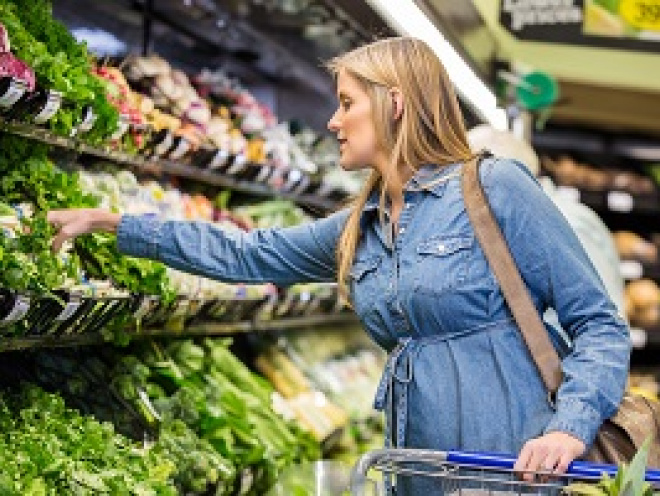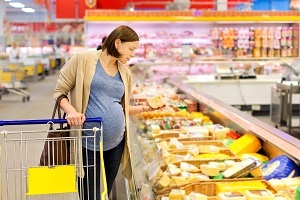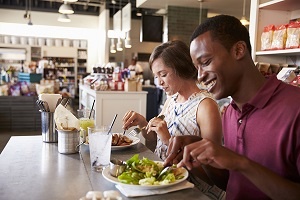We asked Vegan Society Dietitian Heather Russell how you can meet your nutritional needs during pregnancy or breastfeeding if you’re vegan or considering it.
Veganism is a social movement that’s growing rapidly. And a lot of people have questions about eating a vegan diet during pregnancy and breastfeeding. So here are the answers…
Are vegan and vegetarian diets safe during pregnancy?
The Vegan Society works with the British Dietetic Association and both say that well-planned vegan diets can support healthy living in people of all ages, and during pregnancy and breastfeeding (British Dietetic Association, 2017a). The American Academy of Nutrition and Dietetics also agrees that well-planned vegetarian and vegan diets can be healthy (American Academy of Nutrition and Dietetics, 2016).
It’s good to be clear about the differences between a vegetarian diet and a vegan lifestyle. Vegetarians avoid meat, fish and foods made using the products of slaughter (The Vegetarian Society, 2020). Vegans avoid animal use as much as possible, encompassing dietary and non-dietary choices. So a vegan diet excludes all animal products (The Vegan Society, 2020).
How can you prepare for pregnancy if you’re vegan?
It’s never too early to start thinking about nutrition. Some of the considerations are different for vegans, but nutritional planning is important for everyone. Preparing for pregnancy gives you the perfect opportunity to optimise and adapt your diet in advance.
In the UK, folic acid supplementation pre-pregnancy and during the first trimester is recommended to reduce the risk of neural tube defects. The suggested dose is 400 micrograms (NICE, 2008).
Keeping active and maintaining or working towards a healthy weight are also great ways of preparing for pregnancy.
How do I get the right nutrition as a vegan while I’m pregnant?
You can get the right nutrition without animal products by eating a balanced and varied diet and using fortified foods and supplementation wisely.
The two biggest food groups of a balanced diet are fruit and vegetables, and starchy foods – ideally higher fibre choices.
It’s a good idea to eat leafy greens daily for vitamin K and make sure you’re consuming a rich source of carotenoids, which our bodies convert into vitamin A. Spring greens, kale and spinach provide both nutrients. Sweet potato, carrot and butternut squash are sources of carotenoids.
Protein provides building blocks for growth, so it’s important to include good sources in your meals during pregnancy. This could include beans, peas, lentils, peanuts, soya products, cashew nuts, pumpkin seeds and quinoa.
Breastfeeding demands more protein and zinc, which fortunately tend to be found in the same plant foods (British Nutrition Foundation 2016). Wholemeal bread can also provide a useful source of zinc.
All over the world, iron deficiency is a common issue during pregnancy (World Health Organization 2008). So it’s important for everyone to know how to obtain iron from plant foods. Here are some tips to help you optimise your iron status:
- Eat plenty of iron-rich foods daily, such as beans, chickpeas, lentils, tofu, cashew nuts, ground linseed (flaxseed), pumpkin seeds, quinoa, kale, raisins and fortified breakfast cereal
- Boost absorption by adding good sources of vitamin C to meals like bell pepper, broccoli, cabbage, citrus fruits, strawberries and pineapple
- Avoid tea or coffee with meals.
How can I eat well when I’m too tired to cook?
It’s helpful to plan for times when your energy levels might be low. Batch cooking curry, casserole, Bolognese or chilli on a good day can ensure that you have balanced meals in your freezer.
How can I ensure that I’m getting enough of specific nutrients like…
…calcium, omega-3 fat, vitamins D and B12, iodine and selenium?
In general, a good intake of nutrients can be obtained by balancing meals well and choosing nutritious snacks. But it’s wise to give certain nutrients a bit more thought.
Calcium
During pregnancy, try to make sure you’re eating at least a couple of portions of calcium-rich foods every day. Here are some examples:
- 200ml calcium-fortified plant milk
- 200g calcium-fortified yoghurt alternative
- 70g calcium-set tofu (uncooked weight)
- 2 slices of soya and linseed bread fortified with extra calcium.
Breastfeeding increases your calcium requirement by 80% (British Nutrition Foundation, 2016), so it’s even more important to eat plenty of calcium-rich foods.
Consuming 600ml fortified plant milk can cover almost 60% of your target. You can boost your daily calcium intake by including another really rich source of calcium and selecting other foods that provide useful amounts; these foods include watercress, kale, pak choi, almonds and tahini.
Omega-3
Getting enough essential omega-3 fat from plant-based sources can be straightforward. Your basic requirement can be met by snacking on:
- six walnut halves; or
- adding a tablespoon of chia seeds or ground linseed (flaxseed) to cereal or yoghurt alternative.
Some people choose to use a microalgae supplement due to the role of the long-chain omega-3 fats EPA and DHA in brain, nerve and eye development. But there is a need for research into the benefits of adding EPA and DHA to vegan diets.
Vitamin D
Whether you’re vegan or not, vitamin D supplementation is recommended during pregnancy and breastfeeding (NICE, 2014). Many supplements contain animal-derived vitamin D3 but you can obtain vitamin D3 from lichen and D2 animal-free alternatives.
Vitamin B12, iodine and selenium
There are a few other considerations that are specific to vegan nutrition.
It’s essential for vegans to obtain vitamin B12 from fortified foods or supplementation. It’s also important to ensure that your diet contains reliable sources of iodine and selenium. Supplementation is arguably the best option.
Plant milk fortified with iodine is an alternative source of iodine for people consistently consuming at least 500ml a day. Detailed guidance is available in The Vegan Society’s pregnancy and breastfeeding guide.
Is it normal or okay to have cravings for things like eggs and meat when pregnant?
Pregnancy hormones can affect your senses of taste and smell, which can change the foods that you like and dislike (Public Health England, 2020). An unwelcome craving for animal products might influence your dietary choices.
If meat has suddenly become appealing, you might enjoy eating substitute products in moderation. It’s good to use food labels to compare products and keep an eye on added fat, salt and sugar.
If you’re craving eggs, scrambled or stir-fried tofu could satisfy you.
If you’re experiencing aversions to certain foods, you could consider how to replace them with similar sources of nutrition.
How can I deal with morning sickness if I’m vegan?
If you struggle with morning sickness at any point during your pregnancy, you might find these tips useful:
- Sip fluids and eat little and often
- If the smell of hot food is making you feel sick, stick to cold food
- Lower fat and plain foods may be tolerated better
- Eat something dry after you have woken up, such as toast or crackers
- Try ginger-flavoured foods and drinks.
(NHS, 2018)
What if I have a low weight gain during pregnancy?
Healthy weight gain is an important part of pregnancy. The total amount that’s right for you depends on your baseline body mass index, which compares your height with your weight. Further information is available here.
A well-planned vegan diet can provide all the calories and nutrients needed for healthy weight gain during pregnancy. If you’re concerned about low weight gain, your healthcare team will be able to provide support, which might involve a referral to a dietitian.
Do you have to be cautious about eating a lot of certain foods?
Generally, a lot of the food safety issues around pregnancy relate to animal-derived products. So there might actually be fewer considerations for people choosing to get their nutrition from alternative sources.
As always, remember to remove dirt from fruit and vegetables by giving them a thorough wash.
It’s advised that you keep a close eye on your caffeine intake during pregnancy. The recommended limit is 200mg a day, which equates to two cups of tea or instant coffee (NHS 2017).
Are soya-based foods like tofu safe during pregnancy?
There are a lot of food myths around the safety of soya, which is a shame because it’s a valuable source of nutrition. The phytoestrogens in soya-based foods do not do not affect our bodies in the same way as oestrogen, so you can consume soya safely as part of a balanced diet (British Dietetic Association, 2017b).
Fortified dairy alternatives made from soya, calcium-set tofu and soya mince with no added salt are great everyday options.
Further support
A health professional like your local pharmacist can help you to work out if a supplement is suitable for you.
If you have concerns about your vegan diet or complex needs, please talk to your healthcare team about seeing a dietitian for individualised advice.
Further information
A guide about pregnancy and breastfeeding is available on The Vegan Society’s website. This information has been designed to help you learn about your body’s needs during these stages.
Academy of Nutrition and Dietetics. (2016) Position of the Academy of Nutrition and Dietetics: Vegetarian Diets. Journal of the Academy of Nutrition and Dietetics. 116:1970–1980.
British Dietetic Association. (2017a) British Dietetic Association confirms well-planned vegan diets can support healthy living in people of all ages. Available at: https://www.bda.uk.com/resource/british-dietetic-association-confirms-well-planned-vegan-diets-can-support-healthy-living-in-people-of-all-ages.html [Accessed 20th February 2020]
British Dietetic Association. (2017b) Soya foods: food fact sheet. Available at: https://www.bda.uk.com/resource/soya-foods.html [Accessed 20th February 2020]
British Nutrition Foundation. (2016) Nutrition requirements. Available at: https://www.nutrition.org.uk/attachments/article/234/Nutrition%20Requirements_Revised%20Oct%202016.pdf [Accessed 20th February 2020]
NHS. (2017) Foods to avoid in pregnancy. Available at: https://www.nhs.uk/conditions/pregnancy-and-baby/foods-to-avoid-pregnant/ [Accessed 20th February 2020]
NHS. (2018) Vomiting and morning sickness in pregnancy. Available at: https://www.nhs.uk/conditions/pregnancy-and-baby/morning-sickness-nausea/ [Accessed 20th February 2020]
NICE. (2008) Maternal and child nutrition. Public health guideline. Available at: https://www.nice.org.uk/guidance/ph11/resources/maternal-and-child-nutrition-pdf-1996171502533 [Accessed 20th February 2020]
NICE. (2014) Vitamin D: supplement use in specific population groups. Available at: https://www.nice.org.uk/guidance/ph56/resources/vitamin-d-supplement-use-in-specific-population-groups-pdf-1996421765317 [Accessed 20th February 2020]
Public Health England. (2020) Week 5 – your first trimester. Available at: https://www.nhs.uk/start4life/pregnancy/week-by-week/1st-trimester/week-5/ [Accessed 20th February 2020]
The Vegan Society. (2020) Definition of veganism. Available at: www.vegansociety.com/go-vegan/definition-veganism [Accessed 20th February 2020]
The Vegetarian Society. (2020) What is a vegetarian? Available at: https://www.vegsoc.org/info-hub/definition/ [Accessed 20th February 2020]
World Health Organization. (2008) Worldwide prevalence of anaemia 1993–2005. Available at: https://apps.who.int/iris/bitstream/handle/10665/43894/9789241596657_eng.pdf [Accessed 20th February 2020]






